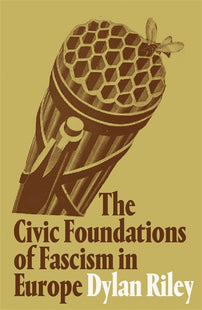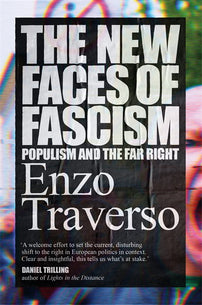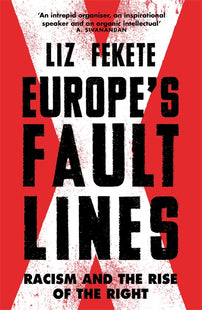Thinking About Fascism Today
Alain Brossat on the rise of the new far-right.

A lesser evil
One of the many disadvantages of the term ‘fascism’ is that it is a term of abuse as well as a political concept. I could earn good marks and send signals to initiates by mentioning a trouble-making little Gauleiter from the Alpes-Maritimes, but this would hardly advance the cause of an analysis of fascism in France today. More generally, the project of restoring ‘fascism’ as a political idea means first of all making a distinction between fascism in the singular, an idea from the twentieth century, and what we are faced with here and now: generic fascism. In the sense that someone might say: ‘There’s something fascist about this statement, this gesture, this proposal -- a disturbing whiff of fascism in the atmosphere, it’s become unbreathable!’
Fascism as a substance, institutional form, party-state, a modality of mass mobilization and cult of the leader, fascism as a form of state violence and cult of war – that fascism, a disaster central to the history of the last century and an abominable figure from the past whose repetition must be prevented at all costs, a fascism broadly interchangeable with the portmanteau concept of ‘totalitarianism’, has become the most unifying bogeyman, but also the most demobilizing. As an absolute evil (to be done away with by all possible means), it has become a vehicle for every kind of accommodation and compromise with the endless figures of relative evil.
The division of political phenomena into these two categories, based on granting exceptional status to a name, a face, a party, a politics, depicted as absolute evil -- in contrast and in opposition to what we are told it opposes, is absolutely disastrous as a political operation. Its effect is to establish for a long time, or even permanently, majority political combinations in the gloomy waters of the ‘lesser evil’; it is an alibi for tolerating (in the name of intolerance towards what is carefully labelled as ‘fascist’) resigned capitulation to all that is most indecent and inconsistent -- Macron as a ‘dike’ against Marine, a politics of the sandcastle as impregnable fortress, an alibi for shameful consent to the government of money, the truncheon and the tightened belt for the great majority.
It is very clear how the scarecrow of fascism ritually and frenetically waved at elections, in the absence of any discussion of what this substantial fascism and its affinities has in common with past fascism(s), paves the way for politics to be the viewed with great disgust, and for the relationship between voting subject (the supposed citizen) and parliamentary or presidential democracy to fall prey to a sense of shame. This is a clear result of the prevailing and constant use of the fascist scarecrow by the hegemonic aggregate in a country like France: the perpetual association of political life with negative feelings and affects – horror of the present, fear of the future, resentment, hatred of the foreigner or supposed foreigner – and, above all, the conviction that, rather than a domain in which vigorous and positive shifts might be possible for the benefit of the greatest number, politics is the domain of a perpetual sacrifice of hopes; all this benefiting the retrenching ideology of unity without deliberation around everything that embodies the ‘lesser evil’, a ‘relative evil’. Whatever the adjective chosen, it means time and again placing political life under the sign of inevitable evil, one evil rather than another, a supposedly lesser evil rather than a horrific one – but one that, in practical application, turns out to be precisely the face of what Walter Benjamin referred to as the continuing figure of catastrophe in the present.
Indeed, the perverse transaction by virtue of which people consent to ‘relative evil’ in politics as the price of the containment of absolute evil has the effect of accustoming them to what Foucault called the intolerable – something that there can be no question of cohabiting with, whose very appearance immediately meets a public and determined ‘not that!’ As far as relations between rulers and ruled are concerned, however, what has characterized French politics since the National Front became its centre of gravity and institutional bogeyman is that arrangements with the intolerable have become established as the rule, not only for the rulers (we are used to that) but, far more seriously, for the great majority of the ruled.
However, the characteristic of a politics that has not given up an orientation towards ends (something quite different from the vaguely ethical sauce of ‘values’) is asserting that there are things there can be no question of compromising with, of relativizing; that on the contrary demand to be refused and rejected absolutely. There is no lack of examples: a government whose ‘inhospitable environment’ has the direct effect of mass drownings in the Mediterranean, a state of emergency perpetually renewed in the name of the crusade against terrorism, neo-imperial campaigns in Africa and the Middle East, among others. In the absence of such bearings – so elementary and so visible that it is sad that this country has so massively lost the shared ability to issue the simple ‘not that!’, leading to a refusal to come to terms in any way whatsoever and in the name of anything with the forces, individuals or parties that embody these figures of the intolerable – we end up serving as a stepping stone for the whole spectrum of windbags of neo-liberal authoritarianism, hastily repainted according to the hazards of elections in the colours of the prevailing fairly-tale antifascism.
At the end of the road, and when the promoters of market democracy really have nothing else to sell, the sleepwalking ‘antifascist’ combination leads, with Macron, to the planned miracle of the election of the candidate of the markets, redesigned as St George defeating the dragon of Le Pen. And it is here that the loop of this perverse logomachy is pitifully closed: the victory of the providential homunculus ensures the continuity of French foreign policy, a policy whose jewels include unfailing friendship with the Zionist supremacists who dream of making the West Bank their new Mexico, with the Moroccan monarchy and the dictator el-Sisi – regimes and potentates that make the suited heirs of the men in camouflage gear look truly amateur in terms of ‘fascism’.
Perhaps the most damaging effect of the concerted use that the political establishment makes of the Front National as a providential repellent is to nip in the bud any attempt to revive discussion on the question of fascism. The phantasmagorical image of a horrific repetition saturates the field of vision of the present and obscures the understanding of what could be, today, a current form of fascism. The rites of exorcism manipulated by the experts in plebiscitary democracy are a powerful obstacle to the deployment of our imaginative faculties when it comes to defining the contours of what fascism would look like in the present.
It is worth recalling here a truth that is as irrefutable as it is constantly repressed: the primary reason why the majority of the country’s elites continue to resolutely oppose the promotion of the Front National to the rank of a party of government is not a matter of public morality; nor is it based on the fear that the FN in power would transform the democratic regime into an ‘authoritarian’ one practising intolerable violence against its opponents, massively destroying civil liberties, etc. It is common knowledge in this respect that Sarkozy stole his security and repressive programme from the FN, that Valls and Hollande then only outbid Sarkozy, and that Macron’s task in this regard is to ‘manage the achievements’ of his predecessors, not forgetting to add his own personal touch, usefully supported by Gérard Collomb[1] as a law-and-order social liberal.
Why the FN is not seen as presentable by the guardians of raison d’état and its state apparatus is something else: it does not offer sufficient guarantees in terms of Brussels orthodoxy and other matters: monetary policy (the question of the euro), EU membership, relations with Russia, the Syrian question, etc. If the FN is not (yet?) ‘eligible’ as a government party, it is not because it is racist, it is not (mainly) because of its heavy historical inheritance, it is not because of its excessive demands in terms of repression and security, it is in no way because it is suspected of having in its sights the establishment of a dictatorship – it is quite simply because the guardians of continuity of neoliberal government on both the political and business side, the markets and the media fear that the arrival of these feverish amateurs, not quite in control of their populist emotional charge, will produce effects of reeling and disruption that a distressed Great Nation and a flagging economy really do not need these days.
Besides, it is already a good while since the neo- or post-fascist impulses that pervade the great sick body of French decline, and therefore the FN, metastasized in all parties of the parliamentary spectrum, and beyond in the social body itself. Even if it never achieves its goals (exercise of power, conquest of the executive), the FN has already won, if not in the classic way of conquering the state, then at least in the dissemination – not of its ‘ideas’, of which it has no more than its competitors on the neoliberal political market – but on the emotional tone that it sets for both the public discourse of state personnel and the spirit of vindictiveness that has conquered broad swathes of the population.
If fascism is current today, this is where it should be detected. A fascism of flows that requires only to be crystallized in campaigns of persecution and forms of power.
Fascism today
Thinking about fascism today means shifting from a political approach (fascism as a hyper-violent political regime) or an economistic one (fascism as a dictatorship of capital) in favour of other references: fascism as the disease of an era, a contemporary pandemic. An epidemic modality of our time whose forms of virulence, field of expansion, symptoms and manifestations need to be studied. Reducing the question of fascism today to its institutional dimension (will post/neo-fascists succeed in coming to power through the ballot box?) means ignoring its essential characteristics: fascism today is something that proliferates at the point of confluence of collective mechanisms, mass emotion (‘the people’), and political calculations that play on two combined themes: law and order, and ‘cleansing’ or elimination of undesirables, of the ‘too many’. These are flows of emotion charged with resentment, barely masked death wishes, uncontrolled aspirations for obscure revenge, the quest for an outlet for accumulated frustrations. Flows that await the opportunity to crystallize in the form of practical action and mechanisms of power, or to exercise their capacity to harm. John Berger put it well: fascism today is ‘what makes those trying to survive [migrants] guilty’, it is what crystallizes in the form of those abject ‘we’s’ that politicians use and abuse and to whom it is vital we oppose a firm ‘they’ -- not us.
To reflect and work on fascism at the present time means identifying those death lines that mark and disfigure our present. Death wishes are always secondary: they thrive where vital aspirations, promises and hopes have been not only disappointed and deceived, but deliberately destroyed by rulers and, more generally, those who set the rules of the game. The flows of negative emotion and death wishes jostle at the gates of the present, where flows of life smash against a glass wall, the armoured glass of ‘reality’ – understood as the general device for governing living humanity, its first rule being the obstruction, prevention and reduction of the field of people’s possibilities of ‘life’ – ‘government’ understood not only as ‘domination’, but as a sequestration of vital powers, the object being to dissociate people from their desires for life and redirect their energies towards revenge.
Fascism today can be seen as a machine for capturing emotions and redirecting subjectivities. It is untrue that ‘unemployment’ mechanically throws unemployed workers into the arms of the post/neo-fascists: the end of full employment and the partial demobilization of the labour force could perfectly well be welcomed as a happy event, in other circumstances or under other premises than those imposed today – who has never dreamed of a massive reduction in hours spent in the workshop, office, classroom, etc.? What fuels fascist impulses today, against a background of partial demobilization of the labour force, is rather the concerted production of a subjective economy of frustration, guilt, hatred of competition. We can clearly see here what is at stake: redirection of the subjectivities of the masses so as to place them under a regime of authority designed to preside over salutary purifications. Authoritarian aspiration and vindictive impulses (or elementary passions) are inseparable here; this is the soil of today’s molecular fascism.
If we remain captive to the ‘models’ of the twentieth century, we see fascism as a concretion, a ‘ball’ of power and compact violence, a machine for total mobilization of the masses for war. We see it, in power, as a dictatorship and therefore as the antonym of ‘democracy’ – was it not the Western ‘democracies’ that were its first victims and joined forces to defeat it, allied to the USSR of course? How then can we reflect on the topicality of fascism in an age of global democracy, in a way that escapes the ‘either or’ of democracy versus fascism formatted by the apocalyptic history of the twentieth century? That is precisely the intellectual, theoretical and imaginative challenge confronting us today: to understand the arrangements, compatibilities and complementarities of market democracy as a global system of ‘governmentalization’ of populations with this fascism of flows whose proliferation scars our world today.
What we must seek to grasp is the articulation of the resolutely archaic element that sustains all kinds of fascism (the desire for regression, the ‘piss and shit’ side that accompanies all fascist subjectivity) with definite features of hypermodernity – like everything connected with the entry of parliamentary politics into its ‘terminal’ age. It is basically the figure of an authoritarian democracy, totally infected and contaminated in the general context of the fascist pandemic. Here we can discern the total mental infirmity of imagining someone like Macron as a ‘barrier against fascism’. Scarcely had he taken over when he undertook to ‘constitutionalize’ and make permanent the state of emergency – the most stereotypical figure of the continuum between authoritarian democracy and molecular fascism.
What this fascism of today ‘preserves’ from twentieth-century fascism is the obscure combination between the desire for ‘nice bonfires’ and squalid festivals, which is not only a passion for destruction, but also for self-destruction (the ‘suicidal’ side of mass fascism), and the passion for authority – the desire for the knout, in short. In other words, there can be no fascism without ‘fascization’, i.e. without circulation between ‘supply’ and ‘demand’, interaction between the social field of ‘the people’ and the political system of the elites. Fascism is never a one-way street, it is permanent exchange and synergy between the ‘suffering’ people and instigators whose (dirty) job is to set the obscure desire of the masses to music and (evil) words.
These are always dynamic processes – the very sense in which we can speak of ‘coming fascism’, as we can speak of ‘coming war’ with the accumulation of time bombs in East Asia or the Middle East. But what is ‘promised’ is, of course, never inevitable; the crystallization of what is at work in the present is never a foregone conclusion. The best we can do in our present time is therefore to grasp the signs, motives, obvious or surreptitious manifestations of those dynamics likely to lead to the catalysis that would give rise to a fascism of power. These symptoms are innumerable, they consist of statements, behaviours, abuses, missed acts, obsessions, rantings, etc. These are the pieces of a kaleidoscope just waiting to be assembled. An inventory of them would be endless, so I shall simply list some of the most exemplary, as it were. A heterogeneous picture, necessarily, since at the present stage we are dealing with a field of dispersion, in which the ‘pieces’ aspiring to compose the picture of a contemporary fascism still remain scattered.
- ‘We’ll keep your address, so we know where to find you,’ says a cop to the young woman in police custody, in retaliation for her detestable habit of filming police interventions. This threat, confident of its impunity and not even concealed, is neither more nor less than the subliminal threat of the death squads. Fascism crystallizes when a section of the state’s repressive bodies takes on the task of rendering ‘justice’, in place of judges who are constantly slowed down by their legalist scruples and slow procedures. We can sense how the cop making this nice promise is pawing the ground with impatience. When the cops on the beat starts to resemble the ‘Droogs’ in A Clockwork Orange, and their leaders the cocaine addicts of Bad Lieutenant (the real one, Abel Ferrara’s), it is because the dénouement is approaching.
- Nostalgia for the military, for hymns, for young people who march and toe the line – the ‘law and order’ right who dream aloud of schoolchildren in uniforms, of raising the flag each morning in the schoolyard, restoring military service, etc. The old Pétainist unconscious of this indestructible spawn is at work here. As the Algerian filmmaker Tariq Teguia succinctly puts it: ‘This Pétainism will have its affiches rouges’.[2]
- There are also those Mussolini-style gestures, the imperious ‘I want!’, clenched jaws, crude airs and praetorian manners, in the style of Sarkozy and his emulator Valls – which clearly show that this temptation of the ‘triumph of the will’ and Caesarism pervades the whole apparatus of institutional politics. The calculation of these specialists in the show of force is transparent – what the masses aspire to in these troubled times is a leader, a real one, with a grip and an iron broom! The whole facho-republican imagination of these little masters of barracks democracy, which is to the contemporary state what the facho-humanism of Clint Eastwood’s films is to American cinema.
- A ‘let them die!’ which is ever less hidden, this desire for disappearance equivalent to a desire for death, is part of the relationship to migrants of a growing number of people in this country, from the summits of the state to the bistros of rural communities. Macron’s joke about the Comorian kwassa-kwassas[3] is exemplary from this point of view – the Comorian point of view – an undesirable human meat destined to feed the fishes... This slip by our presidential homunculus was only an echo of his policies on the ground: in the former Calais jungle, increasingly repopulated by aspiring passengers to England, the police work hard to deny people access to water taps and meals distributed by the voluntary associations – ‘let them die’! This is also fascism: the increasingly common view that the disappearance of the undesirable part of the population is a vital condition for the other; the ‘biopolitical divide’ that runs through society is thus placed under the sign of the terrible, of terror.
- We can also identify an anti-animal fascism (against the wild, free animal, the wolf), just as there is an anti-immigrant, anti-migrant fascism. This exterminating compulsion that has seized entire populations gripped by the phantasmagoria of the wolf as devourer of flocks, an imaginary conveyed at arm’s length by the state personnel. (‘It stops our children sleeping!’, Ségolène Royal once said.) The wolf is always to blame. It is obviously easier to howl for the death of wolves than to reform concentration-camp style killing practices. The sheep’s enemy, we should remember in passing, is not the wolf, it’s the bloke who rears it for the slaughterhouse.
The texture of this fascism is hatred of the present, and hatred of oneself and others in the present. The growing inability to imagine one or more possible presents, or oneself (and others) outside of this damaging present, the growing inability to extract oneself from this present condition – to pause and create something new. This confinement in a present placed under the sign of stupidity and wickedness, is a way of manufacturing those whom Deleuze called the ‘damned’.
Fascism is the punishment that the damned of our time inflict on themselves.
Translated by David Fernbach
Lundi Matin, 21 November 2018
[book-strip index="1" style="display"][1] [A former Socialist, Gérard Collomb was Macron’s hardline interior minister until October 2018.]
[2] [A reference to the notorious ‘red poster’ showing Resistance fighters condemned to death, displayed on Paris walls by the German authorities in spring 1944.]
[3] [In the context of a dispute over migrants from the Comoros arriving in the French colony of Mayotte, Macron remarked on 1 June 2017, in a speech in Brittany, that this indigenous canoe ‘doesn’t fish much, it brings in Comorian’. He was forced to apologise to the prime minister of the Comoros for this distasteful slur.]



